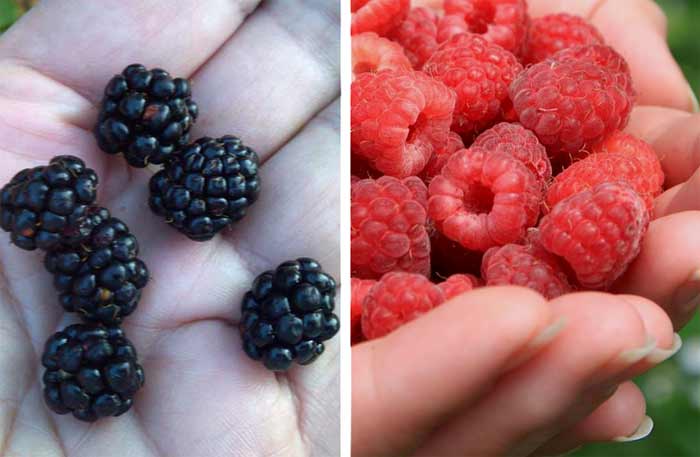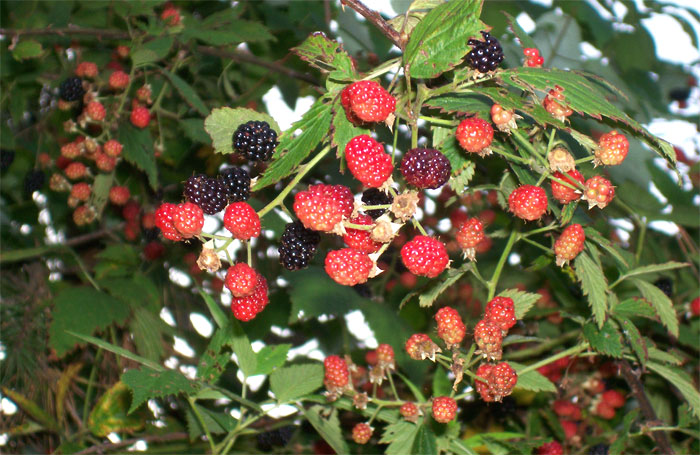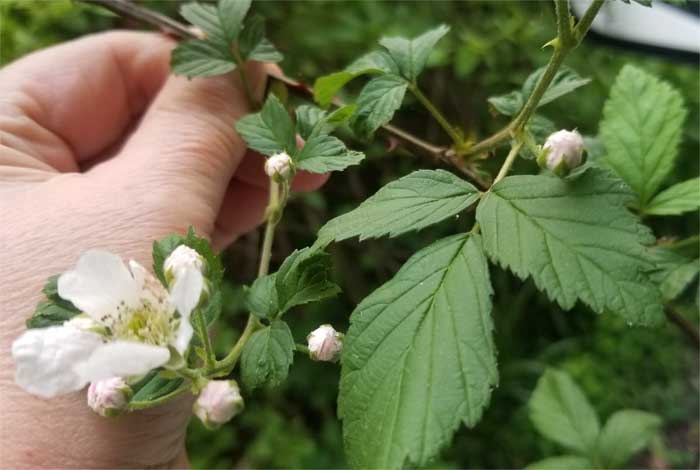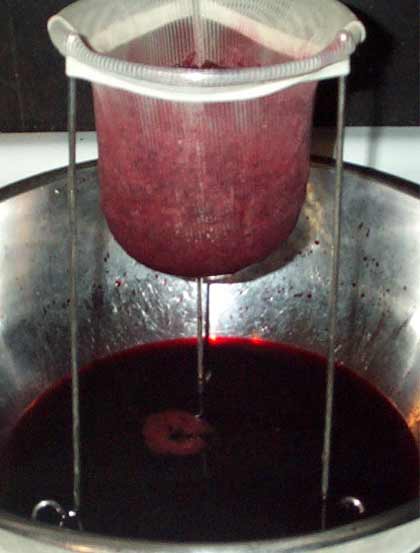Raspberry and blackberry in herbal medicine

Benefits of eating raspberries and blackberries
Raspberries (Rubus occidentalis) and blackberries (Rubus allegheniensisare) nutritional powerhouses that should be eaten as often as possible. Raspberries and blackberries, dew berries, and other brambles are delicious, nutritious, full of live enzymes, and readily available in grocery stores, farmers markets, road side stands, and back yards.

Benefits of raspberry and blackberry tea
Raspberries and blackberries are often used in herbal teas to heal and protect the body. Bramble berries and the leaves are full of vitamins, minerals, antioxidants, and other powerful chemicals that help keep us healthy.
Using raspberry and blackberry in herbal medicine and home remedies
Raspberries and blackberries are useful medicinal herbs that are found growing wild throughout the United States. Blackberry and raspberry bushes supply us with medicinal leaves, bark, roots, and berries.
Both blackberry and raspberry plants are considered brambles. They are used for the same medicinal purposes, so use which ever one you have available for teas, tinctures, and other remedies.

Blackberry and raspberry leaves are very astringent.
Blackberry and raspberry leaves make an astringent herbal tea (or wash). The roots (and bark) are made into decoctions and all parts are used in tinctures and tonics. Read more about making herbal products at home.
Blackberry leaves made a refreshing spritz. Just soak leaves in a mixture of witch hazel and water. Strain and put the liquid in a spray bottle. Use on face as needed to hydrate the skin and energize the body.
More uses for blackberry and raspberry leaf tea
Blackberry and raspberry leaf teas, tinctures, and tonics are good when used internally for sore throat, cough, fevers, mouth sores, indigestion, rheumatism, gum disease, gout, kidney problems, urinary problems, prostate problems, stomach ulcers, and menstrual cramps.
Because of the strong astringent properties, blackberry and raspberry leaf teas can also stop diarrhea. Make a cup or two and sip throughout the day.

Useful for treating obesity
Both blackberry leaf and raspberry leaf tea can be useful when dieting. They help curb the appetite and improve digestion. Including berries in the diet is also useful since they are full of nutrients and fiber.
Use raspberry and blackberry tea for sores and bug bites.
Use raspberry and blackberry leaf tea externally for sores, bug bites, eczema, swelling, burns, scalds, wounds, anemia, hemorrhoids, and as skin toner.
Herbal teas made from blackberry or raspberry leaves may also be used as gargles and are especially effective for sore throats and laryngitis.
Raspberry leaf tea and benefits for females
Raspberry leaf tea should not be used during pregnancy because it causes uterine contractions, although it can be useful during labor. Sipping a warm cup of raspberry or blackberry tea during labor can ease pain and help the mother to relax.
Bramble berries are full of vitamins.
Blackberries and raspberries are diuretic, laxative, and cleansing which makes them useful in the treatment of edema.
Blackberries and raspberries are a great source of nutrients including Vitamin C, Vitamin K, manganese, and dietary fiber.
Of course, berries also make great pies, jellies, muffins, breads, vinegars, and wines.
More about berries
Blackberries and raspberries contain high levels of flavonoids, tannins, phenolic acids, essential vitamins, dietary fiber, and minerals.
They are proven to fight inflammation and oxidative stress which are leading causes of diseases like diabetes and cancer.
The antioxidant properties of blackberries and raspberries are four times higher than other fruits and ten times higher than vegetables. Eating berries is a great way to improve your health!
Scientific studies on blackberries and obesity
Studies show that eating blackberries significantly increases fat oxidation and insulin sensitivity in overweight men.
This is good news for everyone that is obese, or suffering with diabetes.
Directions for making blackberry or raspberry vinegar:
Blackberry vinegar is great for coughs due to colds and flu.
- Cover a quart of berries and leaves with apple cider vinegar and steep for a week in a cool, dark place.
- Check daily and gently push plant material down into liquid to prevent mold (throw away the whole batch if mold appears).
- Strain and keep your blackberry vinegar in the refrigerator until needed.
- To use in the treatment of coughs and sore throats, mix with honey and other herbal expectorants like mullein.
Dry blackberry and raspberry leaves for winter use.
Blackberry leaves should be harvested and dried for winter use before fruit ripens. We use them fresh in tincture and dried for herbal tea.
Blackberries begin to ripen in late June or early July and continue producing for several weeks. We use them in salads, breads, muffins, and for pies, jelly, and flavored vinegars.

Blackberry wine recipe:
Blackberry wine is an old time favorite and is easy to make.
- Crush fruit; measure and add 1 quart boiling water to each gallon of fruit.
- Let stand 24 hours, stirring occasionally.
- Strain and add 2 lbs sugar to each gallon of liquid. Stir well.
- Pour mixture into fermenting jug with air lock. AIr should be able to get out but not get in. A rubber tube run into a jar of water works well.
- Seal container with beeswax. Wine should be ready in three months.
Blackberry and raspberry plants
Blackberry and raspberry bushes, native to eastern North America, are thorny brambles (and are kin to roses).
We have lots of wild blackberries here on Payne Mountain Farms but I have never found a raspberry (although they do grow in neighboring areas).
Raspberries and blackberries can be distinguished from each other by picking them. If the berry has a full center, it is probably a blackberry. If it has a hollow center, it is probably a raspberry. There are many types of raspberries and blackberries including my favorite - dewberries.
First year blackberry canes will not bear fruit until the second year.
Blackberries grow in meadows, clearings, fence rows, and along roadsides.
They prefer moist, well-drained soil. Blackberries are perennials that spread by creeping suckers.
In the North Georgia Mountains blackberries begin blooming in May or June. Blackberry winter occurs at this time when temperatures drop suddenly into the 50’s or 60’s. After highs in the 80’s and 90’s, everyone is freezing and putting on sweaters and jackets.
Other beneficial berries
Strawberries - Ancient Romans used strawberries to cure gout and digestive problems. Strawberry leaves are highly astringent, diuretic, and can help stop diarrhea when used in tea. If your teeth need whitening, rub them with a fresh strawberry which helps removes stains.
Blueberries - Blueberries are full of antioxidants, calcium, and other nutrients. The leaves are used in herbal medicine to lower blood pressure and blood sugar. The berries help the whole circulation system and also boost the health of our eyes.
Many types of different berries grow all over the world. They are eaten raw or made into pies, jellies, wines, and dried for winter use.
Berries can be used to flavor wines, vinegars, syrups, tinctures, and extracts. Some berries, including elderberries, should be cooked before eating! Other berries, like polk, are poisonous to humans and livestock.
*Diabetics should use caution when taking strong infusions (teas) made from blackberry or raspberry leaves since these herbs can lower blood sugar levels. Never use berries that have been sprayed or exposed to traffic exhaust fumes.
Blackberry and raspberry leaves are a strong stimulant and can bring about uterine contractions. Never drink blackberry or raspberry leaf tea when pregnant. Raspberry leaf tea may be safely used during labor as a uterine tonic once contractions are underway.
Blackberry and raspberry leaf tea may cause nausea in some rare cases. If so, discontinue use.
Always consult with your healthcare professional before using any herbal remedy especially if pregnant, nursing, or taking other medications.
Sources:
https://www.ncbi.nlm.nih.gov/pmc/articles/PMC8271923/
https://www.ncbi.nlm.nih.gov/pmc/articles/PMC6115824/
https://en.wikipedia.org/wiki/Blackberry
https://www.webmd.com/diet/red-raspberry-leaf-tea-health-benefits
Blessings to you and yours!
Thanks so much for reading my blog. Jan.

*Note - the information on this website has not been evaluated by the Food and Drug Administration.
© 2005-2024 website design and content by Janice Boling